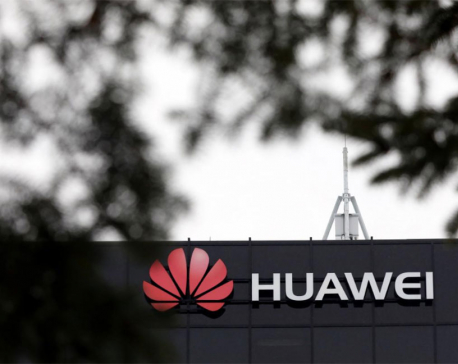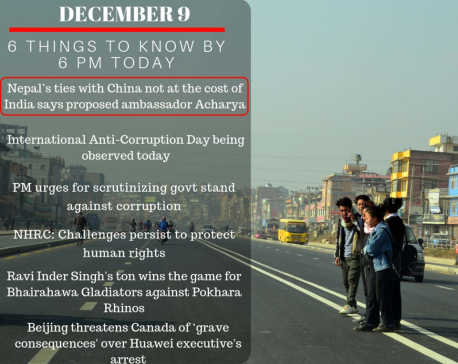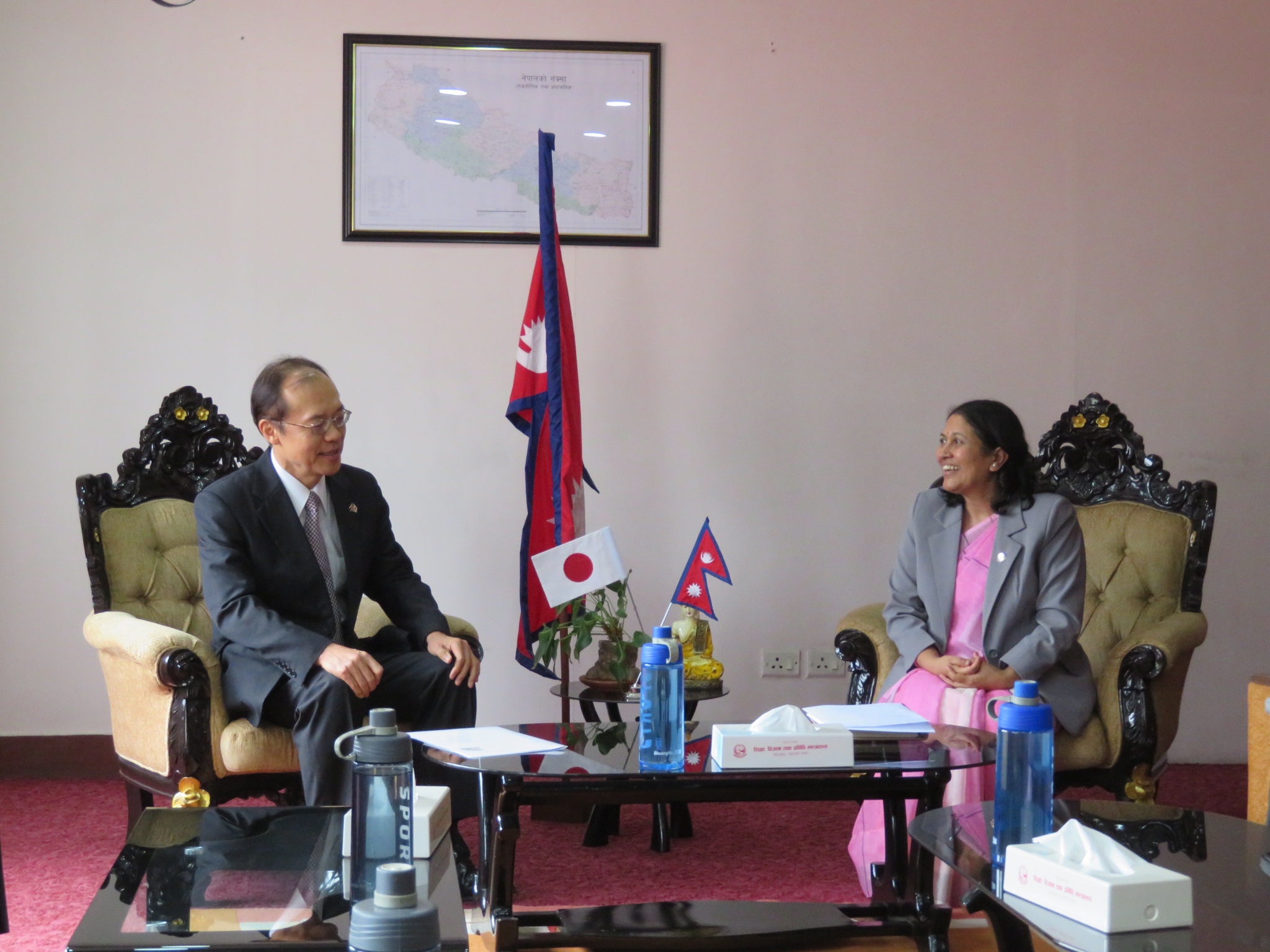
OR
China demands Canada release Huawei executive
Published On: December 6, 2018 03:00 PM NPT By: Associated Press

BEIJING, Dec 6: China on Thursday demanded Canada release a Huawei Technologies executive who was arrested in a case that adds to technology tensions with Washington and threatens to complicate trade talks.
Huawei's chief financial officer, Meng Wanzhou, faces possible extradition to the United States, according to Canadian authorities. The Globe and Mail newspaper, citing law enforcement sources, said she is accused of trying to evade U.S. curbs on trade with Iran.
The timing is awkward following the announcement of a U.S.-Chinese cease-fire in a tariff war over Beijing's technology policy. Meng was detained in Vancouver on Saturday, the day Presidents Donald Trump and Xi Jinping met in Argentina and announced their deal.
Stock markets tumbled on the news, fearing renewed U.S.-Chinese tensions that threaten global economic growth. Hong Kong's Hang Seng lost 2.5 percent and the DAX in Germany sank 1.8 percent.
The Chinese government said Meng broke no U.S. or Canadian laws and demanded Canada "immediately correct the mistake" and release her.
Beijing has asked Washington and Ottawa to "immediately release the detained person" and explain the reason for her arrest, said a foreign ministry spokesman, Geng Shuang.
Huawei Technologies Ltd., the biggest global supplier of network gear used by phone and internet companies, has been the target of deepening U.S. security concerns. Under Trump and his predecessor, Barack Obama, Washington has pressured European countries and other allies to limit use of its technology.
The United States sees Huawei and smaller Chinese tech suppliers as possible fronts for Chinese spying and as commercial competitors. The Trump administration says they benefit from improper subsidies and market barriers.
Trump's tariff hikes this year on Chinese imports stemmed from complaints Beijing steals or pressures foreign companies to hand over technology. But American officials also worry more broadly about Chinese plans for state-led industry development they worry might erode U.S. industrial leadership.
U.S. leaders also worry that Beijing is using the growth of Chinese business abroad to gain strategic leverage.
"The United States is stepping up containment of China in all respects," said Zhu Feng, an international relations expert at Nanjing University. He said targeting Huawei, one of the most successful Chinese companies, "will trigger anti-U.S. sentiment in China."
"The incident could turn out to be a breaking point," Zhu said.
Last month, New Zealand blocked a mobile phone company from using Huawei equipment, saying it posed a "significant network security risk." In August, Australia banned the company from working on the country's fifth-generation network due to security concerns.
On Wednesday, British phone carrier BT said it was removing Huawei equipment from the core of its mobile phone networks. It that began in 2016 following BT's acquisition of mobile provider EE and was in line with network plans in place since 2006.
Huawei is still "an important equipment provider outside the core network, and a valued innovation partner," said a BT statement.
The Wall Street Journal reported this year that U.S. authorities are investigating whether Huawei violated sanctions on Iran. The Chinese government appealed to Washington to avoid any steps that might damage business confidence.
Huawei's biggest Chinese rival, ZTE Corp., was nearly driven out of business this year when Washington barred it from buying U.S. technology over exports to North Korea and Iran. Trump restored access after ZTE agreed to pay a $1 billion fine, replace its executive team and embed a U.S.-chosen compliance team in the company.
Huawei is regarded as far stronger commercially than ZTE. The company based in Shenzhen, near Hong Kong, has the biggest research and development budget of any Chinese company and a vast portfolio of tech patents, making it less dependent on American suppliers.
It also has a growing smartphone brand that is one of the top three global suppliers behind Samsung Electronics and Apple Inc. by number of handsets sold.
Meng was changing flights in Canada when she was detained "on behalf of the United States of America" to face "unspecified charges" in New York, according to a Huawei statement.
"The company has been provided very little information regarding the charges and is not aware of any wrongdoing by Ms. Meng," the statement said.
A U.S. Justice Department spokesman declined to comment.
Huawei said it complies with all laws and rules where it operates, including export controls and sanctions of the United Nations, the United States and European Union.
Meng is a prominent member of China's business world as deputy chairman of Huawei's board and the daughter of its founder Ren Zhengfei, a former Chinese military engineer.
Despite that, her arrest is unlikely to derail U.S.-Chinese trade talks, said Willy Lam, a politics specialist at the Chinese University of Hong Kong.
"I think too much is at stake for Xi Jinping. He desperately wants a settlement," said Lam. "So I don't think this will have a really detrimental impact on the possibility of both countries reaching a deal."
Longer term, however, the case will reinforce official Chinese urgency about developing domestic technology suppliers to reduce reliance on the United States, said Lam.
Trump has "pulled out all the stops" to hamper Chinese ambitions to challenge the United States as a technology leader, Lam said. That includes imposing limits on visas for Chinese students to study science and technology.
"If the Chinese need further convincing, this case would show them beyond doubt Trump's commitment," said Lam.
David Mulroney, a former Canadian ambassador to China, said U.S. and Canadian business executives could face reprisals in China.
"That's something we should be watching out for. It's a possibility. China plays rough," Mulroney said. "It's a prominent member of their society and it's a company that really embodies China's quest for global recognition as a technology power."
Mulroney said Canada should be prepared for "sustained fury" from the Chinese and said the arrest will be portrayed in China as Canada kowtowing to Trump. He also said the Iran allegations are very damaging to Huawei and China will push back hard.
The Chinese will view Meng's arrest on the same day as Trump's meeting with the Chinese leader as a planned conspiracy to do damage, said Wenran Jiang, a senior fellow at the Institute of Asian Research at the University of British Columbia.
"She was in transit though Vancouver. That means the intelligence agencies in Canada and the U.S. were tracking her and planning to arrest her for some time," he said.
Jiang foresees a crisis in relations between the three countries if Meng is extradited. Any talk of a free trade agreement between Canada and China would be over, he said.
U.S. Sen. Ben Sasse, a Republican member of the Senate Armed Services and Banking committees, said Huawei is an agent of China's ruling Communist Party and applauded Canada for the arrest.
"Americans are grateful that our Canadian partners have arrested the chief financial officer of a giant Chinese telecom company for breaking U.S. sanctions against Iran," he said.
You May Like This

Trump, Trudeau seek to distance from Huawei move
WASHINGTON/OTTAWA, Dec 7: President Donald Trump did not know about plans to arrest a top executive at Chinese telecoms giant... Read More...

Canadian PM fires envoy to China after remarks on Huawei case
OTTAWA, Jan 27: In an unprecedented move, Canadian Prime Minister Justin Trudeau on Saturday said he had fired his ambassador... Read More...

Dec 9: 6 things to know by 6 PM today
Your daily dose of missed important news of the day. ... Read More...











Just In
- Japanese envoy calls on Minister Bhattarai, discusses further enhancing exchange through education between Japan and Nepal
- Heavy rainfall likely in Bagmati and Sudurpaschim provinces
- Bangladesh protest leaders taken from hospital by police
- Challenges Confronting the New Coalition
- NRB introduces cautiously flexible measures to address ongoing slowdown in various economic sectors
- Forced Covid-19 cremations: is it too late for redemption?
- NRB to provide collateral-free loans to foreign employment seekers
- NEB to publish Grade 12 results next week







Leave A Comment